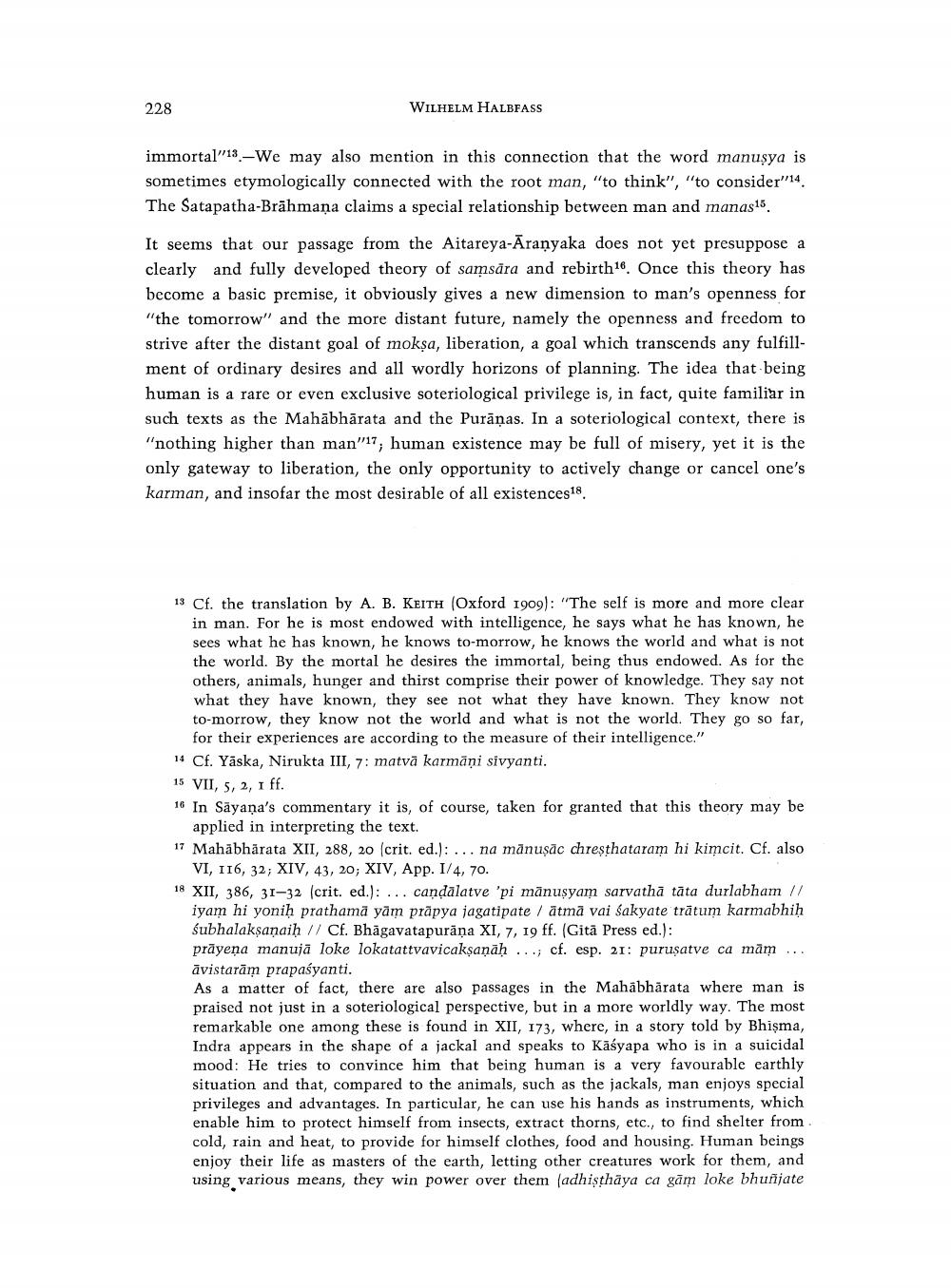Book Title: Anthropological Problems In Classical Indian Philosophy Author(s): Wilhelm Halbfass Publisher: Wilhelm Halbfass View full book textPage 4
________________ 228 WILHELM HALBFASS immortal"13.-We may also mention in this connection that the word manusya is sometimes etymologically connected with the root man, "to think", "to consider"14. The Satapatha-Brāhmaṇa claims a special relationship between man and manas15. It seems that our passage from the Aitareya-Aranyaka does not yet presuppose a clearly and fully developed theory of samsāra and rebirth16. Once this theory has become a basic premise, it obviously gives a new dimension to man's openness for "the tomorrow" and the more distant future, namely the openness and freedom to strive after the distant goal of mokşa, liberation, a goal which transcends any fulfillment of ordinary desires and all wordly horizons of planning. The idea that being human is a rare or even exclusive soteriological privilege is, in fact, quite familiar in such texts as the Mahābhārata and the Purāņas. In a soteriological context, there is "nothing higher than man"17, human existence may be full of misery, yet it is the only gateway to liberation, the only opportunity to actively change or cancel one's karman, and insofar the most desirable of all existences18 13 Cf. the translation by A. B. KEITH (Oxford 1909): "The self is more and more clear in man. For he is most endowed with intelligence, he says what he has known, he sees what he has known, he knows to-morrow, he knows the world and what is not the world. By the mortal he desires the immortal, being thus endowed. As for the others, animals, hunger and thirst comprise their power of knowledge. They say not what they have known, they see not what they have known. They know not to-morrow, they know not the world and what is not the world. They go so far, for their experiences are according to the measure of their intelligence." 14 Cf. Yāska, Nirukta III, 7: matvä karmāņi sivyanti. 15 VII, 5, 2, 1 ff. 16 In Sāyaṇa's commentary it is, of course, taken for granted that this theory may be applied in interpreting the text. 17 Mahābhārata XII, 288, 20 (crit. ed.): ... na mānuşāc chresthataram hi kimcit. Cf. also VI, 116, 32; XIV, 43, 20; XIV, App. I/4, 70. 18 XII, 386, 31-32 (crit. ed.): ...candalatve 'pi manusyam sarvathā tāta durlabham // iyam hi yoniḥ prathamā yām prāpya jagatipate / ātmā vai sakyate trātum karmabhih śubhalaksanaih // Cf. Bhagavatapurāna XI, 7, 19 ff. (Gitā Press ed.): prāyena manuja loke lokatattvavicakşaņāḥ ... cf. esp. 21: puruşatve ca mam... āvistarām prapaśyanti. As a matter of fact, there are also passages in the Mahabharata where man is praised not just in a soteriological perspective, but in a more worldly way. The most remarkable one among these is found in XII, 173, where, in a story told by Bhişma, Indra appears in the shape of a jackal and speaks to Kāśyapa who is in a suicidal mood: He tries to convince him that being human is a very favourable earthly situation and that, compared to the animals, such as the jackals, man enjoys special privileges and advantages. In particular, he can use his hands as instruments, which enable him to protect himself from insects, extract thorns, etc., to find shelter from cold, rain and heat, to provide for himself clothes, food and housing. Human beings enjoy their life as masters of the earth, letting other creatures work for them, and using various means, they win power over them (adhisthāya ca gām loke bhusatePage Navigation
1 2 3 4 5 6 7 8 9 10 11 12
